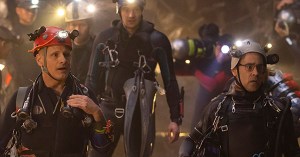How Family-Friendly Are Daddy’s Home 2 and Murder on the Orient Express?
by Christy Lemire | November 10, 2017
Both of the big films out this week skirt that PG-13 line between more adult-oriented films and stuff aimed squarely at kids, so if you’re thinking of taking the family to the Will Ferrell/Mark Wahlberg comedy or Kenneth Branagh ensemble murder mystery, here’s what you’ll want to know.
NOW IN THEATERS
 21%
21%
Rating: PG-13, for suggestive material and some language.
It’s the sequel to the 2015 comedy Daddy’s Home, which I’m not sure anybody needed, but here it is anyway. Similar to last week’s A Bad Moms Christmas, in which the moms’ moms invaded, this time the dads’ dads show up to celebrate the holidays. Madcap hilarity ensues. Mel Gibson plays Mark Wahlberg’s randy father and John Lithgow plays Will Ferrell’s cuddly pop. There are mature gags involving flirtations with women, and Gibson’s character tells some off-color jokes that younger viewers won’t get. While there are several children in the supporting cast, they’re often the butt of jokes or recipients of terrible (and crass) advice, and a couple of the youngsters get drunk on eggnog. One character has a shoplifting habit. There’s also quite a bit of language scattered throughout. And several moments of slapsticky humor are actually quite violent. It’s not very good, but it’s probably OK for viewers around 11 or 12 and older.
 60%
60%
Rating: PG-13, for violence and thematic elements.
Well there’s the word “murder” in the title, so clearly someone gets killed here. But even more fundamentally, director and star Kenneth Branagh’s adaptation of the classic Agatha Christie mystery will probably be too grown-up for younger viewers, who might find it slow and hard to follow. Branagh leads an all-star cast (Johnny Depp, Michelle Pfeiffer, Willem Dafoe, Judi Dench, Daisy Ridley, Penelope Cruz) as the world-famous detective Hercule Poirot. When a passenger on the Orient Express train is murdered, Poirot must solve the crime by investigating the handful of other people on board. There’s a lot of adult discussion of motive, as well as graphic description of the killing itself. There are also some physical altercations between several of the characters. Many characters smoke. And the subject matter in general is probably not suitable for viewers younger than 10 or 11.
New on DVD
 70%
70%
Rating: G
Kids of all ages can enjoy this third film in the animated Cars franchise, and they probably have done so already. It’s totally harmless and not even remotely as complicated or challenging as the best of the Pixar universe. Cars 3 once again centers on Lightning McQueen (voiced as always by Owen Wilson), who’s now finding that, as a veteran racer, he’s not nearly as fast as his newer, more high-tech competitors. He works with a younger, female trainer named Cruz (Cristela Alonzo), who had long dreamed of racing herself. Basically, it’s about middle-age angst, which should be super fun for the kids in your family. Lightning suffers a couple of bad crashes, and he and Cruz find themselves in danger when they accidentally enter themselves in a demolition derby. But there’s nothing inappropriate here.
 53%
53%
Rating: PG-13, for mature thematic content involving family dysfunction, and for some language and smoking.
Mature tweens and older are the right audience for this drama, based on Jeannette Walls’ best-selling memoir about her horrific youth. Director and co-writer Destin Daniel Cretton Short Term 12 doesn’t shy away from showing us the squalor, poverty and hunger she and her siblings endured. The film flashes back and forth between Jeannette’s life as an up-and-coming New York journalist in 1989 (when Brie Larson plays her) and her uncertain childhood (when Ella Anderson plays her). The kids’ alcoholic father (Woody Harrelson) and flighty artist mother (Naomi Watts) wanted the family to live off the grid, which meant multiple moves from town to town, no school, and often no food. Jeannette frequently suffers physical and mental abuse. In one scene, she severely burns herself on the stove because her mother can’t be bothered to feed her; in another, she nearly drowns in a public pool when her father throws her into the deep end to teach her how to swim. All of these perils are in the name of making her (and the other kids) stronger, of giving them independence and character. But it’s harrowing to watch. The film also includes scenes of abandonment and neglect, as well as a moment when the father encourages teenage Jeannette to visit the apartment of an older man who tries to sexually assault her. Ultimately, The Glass Castle is about forgiveness and redemption, but it’s a long and painful haul to get there.







